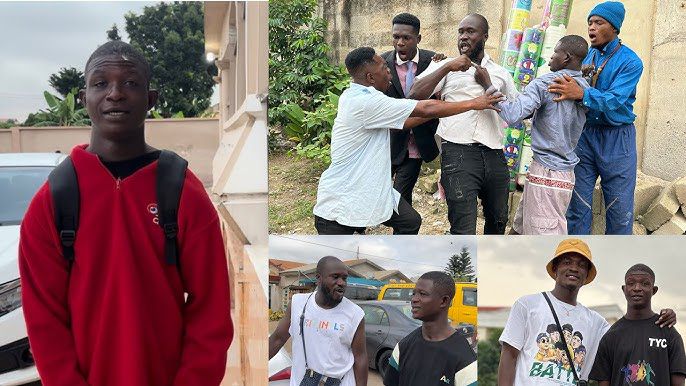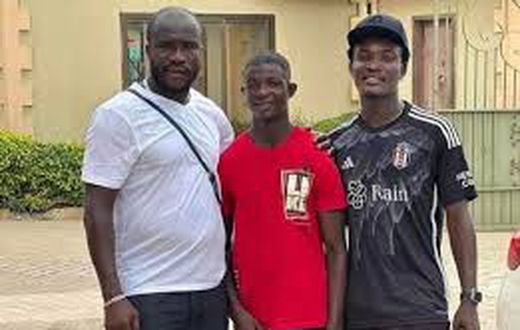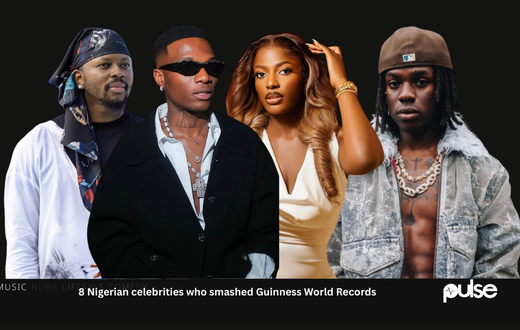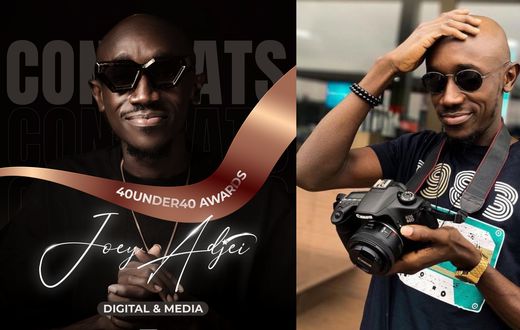Ghanaian actor Strika, widely recognized by film enthusiasts across West Africa for his breakthrough role in “Beasts of No Nation,” has stepped forward to address recent controversy following allegations of theft reportedly brought against him by Gunshot—a well-known protégé under popular comedic actor Dr Likee. In a candid discussion, Strika (born Emmanuel Nii Adom Quaye) shares his own account and aims to clarify the claims making rounds on social media and news outlets.
According to reports from GhanaWeb and other entertainment news outlets, the situation unfolded after Gunshot reportedly decided to offer Strika a fresh start when the actor’s career stalled, attributed by some sources to substance dependency and housing instability. Gunshot allegedly provided support, inviting Strika to stay at his residence and assisting him as he sought entry back into the Kumawood film industry. Under the mentorship provided by Dr Likee (real name Ebenezer Akwasi Antwi), Strika appeared to be on a path to career rehabilitation, gradually regaining visibility within the West African entertainment scene.
Strika Responds to Theft Allegations Following Reported Exit from Dr Likee’s Fold
Since the alleged incident and his subsequent exit from Dr Likee’s team, Strika has not been spotted with Gunshot or any other key associates of the well-known comedian. During a recent interactive session on TikTok, as reported by Pulse Ghana and monitored by several West African digital platforms, Strika provided his initial public response to the allegations. He described the theft claims as an attempt to damage his reputation, attributing them squarely to Gunshot. He categorically denied any involvement in—or knowledge of—the reported missing mobile phone belonging to his former mentor.
Addressing further rumors circulating within entertainment circles, Strika also commented on accusations related to money allegedly missing from Gunshot’s personal drawer. While engaging his online audience, he neither confirmed nor fully denied the specific details of this claim. Instead, Strika stated his belief that his circumstances were being manipulated by content creators and media handlers to generate publicity and attract social media views. Announcing his intention to give a comprehensive interview, Strika noted that he is prepared to directly challenge and debunk what he called Gunshot’s “misleading statements.”
“I grew up on the streets. My survival lessons and skills, I credit to my experiences living rough,” Strika stated during the TikTok live conversation, as quoted by MyJoyOnline. “I still carry some of those habits—it’s not easy to leave them behind all at once. I try every day, for myself. But the claim that I stole a phone—I must say, that’s not true.” His comments during the session appeared to resonate with many fans across Ghana and Nigeria, sparking conversations about resilience, stardom, and the realities faced by young actors in Africa.

Nigerian and West African Reflections on Celebrity Allegations
Issues of public accusations and personal struggles among celebrities are not unfamiliar to audiences in Nigeria and across West Africa. Fans and entertainment industry observers have pointed out the complexities faced by rising stars, especially when navigating fame at a young age or after periods of hardship. For many, Strika’s journey mirrors that of child actors internationally and within Nollywood, where sudden stardom can be followed by personal and professional obstacles.
Some Nigerian film enthusiasts who followed Strika’s breakout role alongside Idris Elba in “Beasts of No Nation” have expressed concern over the lack of robust support networks for young actors. Others suggest that greater mentorship and access to mental health resources—topics gaining attention in the Nigerian and Ghanaian entertainment industries—could help mitigate such controversies and misunderstandings.
Global Conversation: Public Scrutiny and the Culture of Celebrity
Internationally, public disputes involving celebrities often attract widespread speculation. In Africa, allegations like those against Strika can swiftly become talking points on digital platforms from Lagos to Accra and abroad, partly due to the strong influence of social media in shaping narratives and public opinion. According to media scholars, globalization of West African pop culture means that even relatively small incidents can escalate in visibility, sometimes fueling misinformation or prejudgment.
Stakeholders in both Nigeria and Ghana argue that such developments underscore the importance of fact-based journalism and responsible audience engagement, urging fans and commentators to focus not only on accusations but also on support and rehabilitation. These views are echoed by mental health advocates and creative industry professionals, who highlight the need for balanced reporting and compassion toward artists navigating adversity.
Cultural Controversy, Rehabilitation, and Second Chances
Strika’s situation opens a broader discussion on the themes of redemption, public image, and the long-term effects of early fame—a subject relevant to many in the larger African creative community. Critics and fans alike have voiced the need for industry-wide reforms, including clearer guidelines for handling accusations and better support structures for vulnerable artists. As in many entertainment industries worldwide, the interplay of growth, error, and the quest for second chances is a recurring feature.
For Nigerian audiences, Strika’s experience resonates with the lived realities of many young talents in Nollywood and our local creative spaces—where opportunities and pitfalls often coexist, and the lines between public opinion and personal redemption are seldom clear-cut.
What’s Next for Strika and Lessons for the Industry?
As at the time of publishing, Strika has not been charged with any crime, and the allegations remain a subject of public debate. The actor’s future steps—including his plan to grant a full interview and confront the reports head-on—may further clarify the situation for fans and observers.
This episode serves as a reminder of the challenges of celebrity in Nigeria, Ghana, and across Africa, highlighting the need for empathy, careful journalism, and robust systems of support for artists at risk. Ultimately, the manner in which these issues are handled could shape expectations for future talents in the industry and contribute to ongoing conversations about fairness and rehabilitation.
How do you think the West African entertainment industry can better support young stars dealing with adversity—and what reforms would you recommend for fair and sensitive management of celebrity disputes? Share your thoughts below.
Food inquiries: food@nowahalazone.com
General support: support@nowahalazone.com
Story sales/submissions: story@nowahalazone.com
Follow us on Facebook
Follow us on X (Twitter)
Follow us on Instagram










